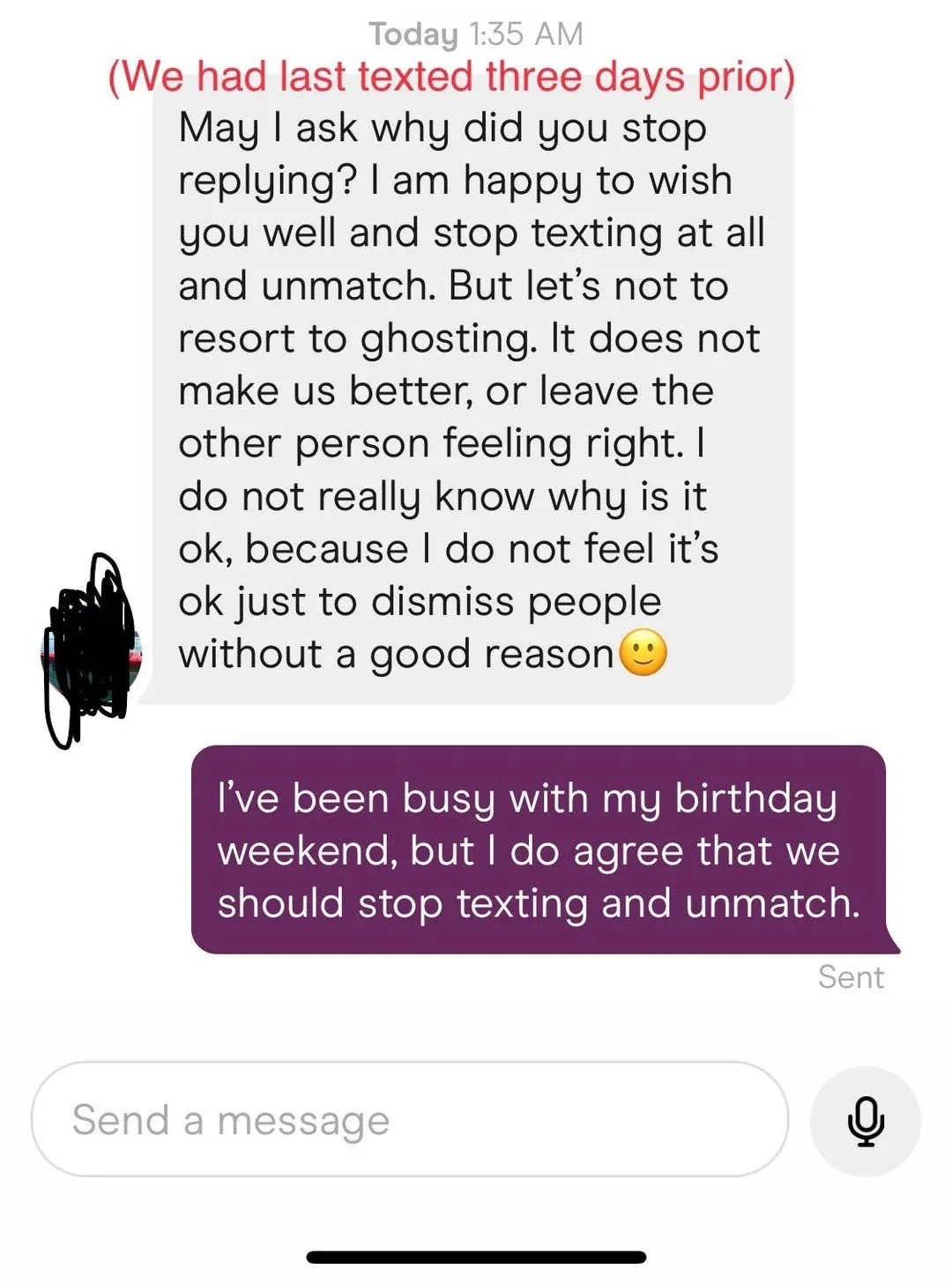Mental Health Impact of Ghosting in South Asian Dating
As we continue living deeper into May, a month dedicated to both Mental Health Awareness and Asian Pacific Islander Desi American Heritage, I feel compelled to shed light on the pervasive issue of ghosting and its toll on mental well-being, particularly within the South Asian community. In today's digital age, where interactions are abundant and easily forged, each instance of ghosting can exacerbate existing mental health challenges, compounded by the weight of cultural expectations surrounding relationships and marriage.
Let's start by clarifying what exactly constitutes ghosting, a term that's been tossed around with varying interpretations. According to the Oxford Dictionary, ghosting refers to "the practice of ending a personal relationship with someone by suddenly and without explanation withdrawing from all communication."
Breaking this down, it becomes evident why some scenarios labeled as ghosting may not fit the bill. Firstly, ghosting typically involves a personal relationship, yet in the realm of dating apps and online messaging, connections often remain superficial. These interactions, while initiated with the intent of exploring compatibility, may not necessarily evolve into genuine personal relationships. Thus, if communication ceases after a few exchanges, it doesn't necessarily qualify as ghosting but rather as a part of the dating process where both parties assess compatibility.
The second criterion for ghosting involves abruptly withdrawing from all communication without explanation. However, if someone expresses disinterest or signals a lack of compatibility, they've essentially provided closure. It's crucial to respect individuals' autonomy in their dating journey and acknowledge that their actions aren't a reflection of one's worth but rather a personal choice.
Let's delve into the intricacies of three different scenarios that shed light on the complexities of ghosting:
Group Chat Dilemma: A recent conversation in one of our WhatsApp groups highlighted the importance of offering closure in dating interactions. One member sought advice on ending a conversation with a match she no longer found promising. While her usual approach was to "ghost" and leave the match on read, group members suggested a more respectful approach. Together, they crafted a concise yet empathetic message expressing her disinterest while wishing the other person well in their search for compatibility. This proactive step not only provided closure but also prevented misconceptions and undue anxiety.
Persistent Pursuit: Another scenario illustrates the misconception surrounding ghosting. When one party declines a match without engagement, subsequent attempts to initiate contact aren't ghosting but rather persistence in the face of clear disinterest. Despite the lack of reciprocation, the pursuing party continued their efforts, leading to discomfort and miscommunication. This distinction is vital in preventing misunderstandings and preserving respectful communication.
App-Induced Misconceptions: Furthermore, dating apps' efforts to address ghosting through features like chat archiving or chat limitations inadvertently contribute to misconceptions. While intended to streamline user experience, these features can inadvertently heighten anxiety by creating the illusion of being ghosted. Users interpreting archived chats or chat limitations as ghosting may experience heightened feelings of rejection and inadequacy, further exacerbating mental health challenges.
Despite differing interpretations of ghosting, its impact on mental health cannot be understated. Each instance, however trivial it may seem, can evoke feelings of rejection and inadequacy, exacerbating existing mental health challenges.
Moving forward, I advocate for transparent communication and closure in all interactions, even those that may not lead to a lasting connection. By articulating intentions and respecting boundaries, we can foster a dating culture rooted in empathy and understanding, alleviating the mental toll of ambiguous endings.
Similarly, for those who feel they've been ghosted, it's essential to consider the other person's perspective and recognize that their actions are not a reflection of one's worth. By reframing these experiences and prioritizing self-care, we can navigate the modern dating landscape with resilience and grace. While ghosting may be a ubiquitous phenomenon in modern dating, it's imperative to redefine its significance and prioritize mental well-being above all else. By fostering open communication, empathy, and self-awareness, we can navigate the complexities of dating with integrity and compassion, alleviating the mental burden of ghosting in the process.


